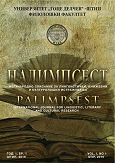BUSINESS GERMAN IN GERMAN STUDIES PROGRAM: CURRICULUM DESIGN AND INTRODUCTION TO STUDY CONTENT
DOI:
https://doi.org/10.46763/PALIM24917225kAbstract
In recent years, the demand for Business German in the context of teaching German as a foreign language has seen significant growth, driven by the expanding international division of labor and the increasing economic interconnection in the wake of globalization. There is a strong interest in acquiring profession-relevant knowledge of the German language to become linguistically proficient in the professional sphere of the business world. In Albania as well, the implementation of Business German has been advanced, particularly at the Faculty of Human Sciences at Elbasan University. Business German is a mandatory subject within the curriculum of the German Studies program at the department mentioned above. This decision underscores the relevance and appreciation of the German language within the professional context, offering students a targeted preparation for the demands of business communication. The integration of Business German into the field of German Studies in Albania provides students with the opportunity to align their linguistic skills specifically with the realm of business. They gain a solid understanding of specialized terminology and communicative requirements within the economic environment, significantly enhancing their professional prospects. This development mirrors the need to cultivate skilled professionals with proficiency in Business German to engage in international enterprises and business relations. By focusing on the practical applicability of the German language in a professional context, graduates are better prepared for the challenges of the contemporary global job market, thereby enhancing their career opportunities both within Albania and on an international scale.
Keywords: Business German; Curriculum Development; Competencies; Intercultural Communication; Terminology.


